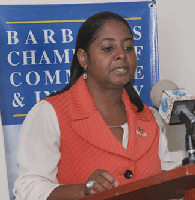Florida Conference On Current Caribbean Issues Tackles US/Cuba Relationship

MIRAMAR – Caribbean governments have failed to recognize the true impact of tourism on regional economies and there is need for regional destinations to re-examine their product so as to offer new and different experiences. This was the view expressed by Ms. Barbara Braithwaite, President of the Barbados American Chamber of Commerce (BACC) in her presentation at last Thursday’s (Sept. 10th) Florida Conference on Current Caribbean Issues: The Diaspora Discussion, held at the Miramar Cultural Center. The conference was put on by the Institute of Caribbean Studies (ICS) and the Greater Caribbean American Chamber of Commerce (GCACC).

file photo
Speaking on the panel US/Cuba Normalization and the Challenges and Opportunities for the Caribbean and its Diaspora Ms. Braithwaite outlined a number of strategies that could be employed to cushion the negative impact the opening up of the Cuban tourism market could have on the rest of the Caribbean’s hospitality sector.
Here is the text of Ms. Braithwaite’s presentation:
First of all I would like to congratulate and offer sincere thanks to the organizers of this conference on behalf of the board of directors and members of the Barbados American Chamber of Commerce. The issues identified for discussion are indeed critical to the Caribbean region and its people here in the Diaspora. Speaking from a Barbadian perspective the discussion on the impact of normalization of US/Cuba relations on the Caribbean and its Diaspora is very much needed. As you know tourism is the major industry of Barbados and the eventual opening up of Cuba is certain to pose major challenges and hopefully present some opportunities for the Barbados tourism market.
According to a Christmas Day article in the Barbados Nation headlined “Don’t Fear Cuba”, Barbados should move aggressively to take advantage of the economic opportunities resulting from the establishment of diplomatic relations between Cuba and the USA. The article suggests that a Cuba/Caribbean multi-destination marketing and sales approach could argue well for Barbados. Cuba is the largest potential tourism destination in the Caribbean. Without normalization of relations with the United States, Cuba attracted almost three (3) million tourists last year. With the travel restrictions removed Cuba can well within five years, surpass the Dominican Republic as the leading tourist arrivals destination in the Caribbean.
If the strategy is to develop a Cuba/Caribbean multi-destination strategy then careful planning must go into a sales and promotion effort where the costs of advertising and promotion will be shared by the participating destinations. Additionally, Caribbean destinations, and by destinations I mean operators in the industry will have to review their pricing policies which will have to include the prices of airline tickets, cruises and related services.This is critical since the travel cost to Cuba is expected to be much cheaper than to the Caribbean.
Further, Caribbean destinations will need to examine their product to offer experiences beyond sand and sea. Greater emphasis will have to be put on cultural tourism, history tourism, educational tourism and medical tourism. We will have to promote more of our festivals and traditions and organize these at a quality level that would make it a rich experience for visitors. In the case of Barbados we will have to put greater emphasis on some of our less promoted festivals and traditions and raise these to levels as close as possible to our Crop Over Festival. In the case of medical tourism, this will require some additional research into the medicinal value of some of our plant life about which their virtues have been extolled for centuries. Medical tourism development in the Caribbean could offer lucrative investment opportunities for entrepreneurs and health professionals in the Diaspora.
Another critical aspect of the Caribbean’s ability to maintain and increase market share in a post embargo tourism environment is its preparedness for natural disasters and its ability to recover quickly. Long periods of airport and port closures, of hotels and other facilities will not augur well for the sustainability of the tourism sector.
The International Monetary Fund (IMF) in a study entitled “The Vacation is Over” predicts “a seismic shift in the Caribbean tourism industry” when the Cuba market opens up. The Caribbean Hotel and Tourism Association (CHTA) points out that for too long the Caribbean has taken its tourism industry for granted. And that’s quite true. Many of our governments fail to recognize the true impact of tourism on our economies and to quote our conference chair, Mr. Wesley Kirton, who has said before that the people of the Caribbean, especially those employed in the hospitality sector have to see themselves “as providing service and not being in servitude.”
I certainly am not advocating that the Caribbean down play its reliance on agriculture and other commodities but tourism must be truly recognized for its significant contribution to Caribbean economies. This would be best demonstrated by increased investment in education and training not only of workers in the industry but also of Caribbean society in general which must embrace tourism as a key sector of their livelihoods.
There are still many questions to be answered. The debate must continue. I hope this discussion today will “throw up” new ideas, creative strategies and workable solutions to the challenges that will confront the Caribbean tourism industry as well as identify feasible opportunities which will arise out of this history-making total normalization of US/Cuba relations, if and when it happens. I say total normalization since there is still the embargo to be removed and much will depend on what happens next year November at general elections here in America.
I thank the Institute of Caribbean Studies and the Greater Caribbean American Chamber for the opportunity to have contributed to this discussion. I look forward to the ensuing discussions.
ADVERTISEMENT

